While I’m a big fan of squeeze and pump-type water filters, manually filtering water for a large group of people is a tedious, time-consuming task.
It’s much better to let gravity do the work for you.
But, because gravity filters are prone to clogging and bursting, the system you choose must be tried and tested.
Our recommendations are based on these factors:
- What they treat
- Filter lifespan
- Flow rate
- Versatility
Quick Picks
- Best Overall – LifeStraw Flex with Gravity Bag
- Best for Wilderness Use – MSR Trail Base
- Best for Home Use – Travel Berkey Gravity
Best Gravity Water Filters Reviewed
 LifeStraw Flex with Gravity Bag
LifeStraw Flex with Gravity Bag
Why Choose? You need a versatile water filtration system at a low cost
Specs:
- Can be used as: Straw, squeeze, gravity filter
- Size: 4 liters
- Output: 30L/hour
- Bacteria/protozoa: Yes
- Viruses: No
- Chemicals/bad tastes: Yes
- Filter medium: 0.2-micron hollow fiber and activated carbon
- Lifespan: 2,000 liters (hollow-fiber), 100 liters (activated carbon)
Review:
While I’m not a fan of the original LifeStraw (see why we prefer the Sawyer Mini), the LifeStraw Flex with gravity bag is a cool setup. Simply attach the Flex filter to the included 1-gallon gravity bag, hang it high, and aim the water into a (preferably) wide-mouthed bottle.
There is a two-stage filtration system. The first stage is a hollow fiber filter which removes bacteria and protozoa. The second stage is an activated carbon filter which removes chemicals and bad tastes.
The downside is that the LifeStraw Flex gravity system is SLOW. For clear water, you might get the advertised 30 liters per hour. If the water is even slightly murky, you might only get 1 liter per hour in practice.
Also, expect the filter to get clogged frequently and spent a lot of time backflushing it. Further, there are many reports of the Flex Gravity leaking where the hose connects to the filter.
On the positive side, the Flex filter can be unscrewed from the gravity bag and used as a straw or screwed on a plastic bottle to use as a squeeze filter.
- Use multiple ways
- Affordable
- Two-stage filtration
- Wide-mouth bag is easy to fill and clean
- Hydration pack compatible
- Incredibly slow
- Prone to clogging
- Hose often leaks at the filter connection site
 MSR Trail Base Gravity Water Filter System
MSR Trail Base Gravity Water Filter System
Why Choose? A well-designed system for wilderness backpacking or bugging out
Specs:
- Can be used as: Gravity and pump filter
- Size: 2 liters and 4 liters
- Output: 1L/minute
- Bacteria/protozoa: Yes
- Viruses: No
- Chemicals/bad tastes: No
- Filter medium: 0.2-micron hollow fiber
- Lifespan: 1,500 liters
Review
MSR makes serious products for outdoor use, some of which were designed for the US Military. Their Guardian filter is one of our top picks for survival water filters. The Trail Base system is one of the most innovative designs for a gravity filter that I’ve seen. It is also versatile since the gravity filter component can be removed and used as a pump filter when you need water quickly.
The gravity filtration system comes with a dirty water reservoir (4L), a hose, a filter, and a clean water reservoir (4L). You don’t have to use the clean water reservoir; the filter can be aimed into any water bottle or your mouth.
I love the MSR Trail Base gravity filter because the outlet hose is set slightly up on the side of the bag to create a sediment trap. The outlet is at the bottom of the bag with other filters, which means it quickly gets clogged by falling sediment when filtering murky water (think pond scum). With this system, residue won’t affect the outlet hose.
The reservoir bags on the MSR Trail base are very tough. In theory, you could even attach them to the top of your pack and filter water as you trek. The wide-mouthed bags are easy to fill and can be flipped inside out to dry. Another cool feature is that you can drink directly from the clean water reservoir.
Note that the filter on the Trail Base is not the same as the MSR TrailShot. Even though it looks similar, it isn’t compatible with the system.
- Use as gravity or pump filter
- Not as prone to clogging
- Sediment trap in reservoir
- Reservoir bags are very tough
- Easy to pack and use in the field
- Doesn’t filter viruses or chemicals
- Pricier option
- Short lifespan
 Platypus GravityWorks
Platypus GravityWorks
Why Choose? You need a sturdy gravity filter for backcountry use
Specs:
- Can be used as: Gravity filter
- Size: 2L, 4L or 6L
- Output: 1.75L/minute
- Bacteria/protozoa: Yes
- Viruses: No
- Chemicals/bad tastes: No
- Filter medium: 0.2-micron hollow fiber
- Lifespan: 1,500 liters
Review
The Platypus GravityWorks was one of the first gravity water filters on the market and is still one of the most popular. I don’t like it nearly as much as the MSR Trail Base system and think that the MSR is designed better.
The Platypus gravity filter would be much better if it also had a sediment trap and the reservoirs were wide-mouth for easy filling and cleaning. However, the Platypus gravity filter is cheaper and holds up well enough to be used for emergency prepping.
The GravityWorks is a 0.2-micron hollow fiber filter like most water filters. It has a lifespan of 1,500 liters (though it may clog well before this), and it’s easy to buy replacement filters. The two reservoir bags are pretty sturdy and can handle the rigors of camping or backpacking. If they break, you can purchase replacements easily.
One nice feature is that the dirty water reservoir has a valve that automatically closes when you disconnect the hose. This will keep you from disconnecting and accidentally spilling water all over yourself (yes, it has happened to me).
- Comes in various sizes
- Fairly durable
- Replacement parts readily available
- Quick-disconnect valve on reservoir
- Has hose clamp for stopping water flow
- Clogs fairly quickly
- Dirty water reservoir is hard to clean
- Narrow mouth; hard to fill
 MSR AutoFlow XL
MSR AutoFlow XL
Why Choose? Large filter which doesn’t clog too quickly
Specs:
- Can be used as: Gravity filter
- Size: 10 liters
- Output:Up to 1.75 liters/minute
- Bacteria/protozoa: Yes
- Viruses: No
- Chemicals/bad tastes: No
- Filter medium: 0.2-micron hollow fiber
- Lifespan: 1,500 liters
Review
The MSR Autoflow XL is almost identical to the Platypus GravityWorks. Both use the same type of filter and have nearly the same flow.
However, a few features make me prefer the MSR Autoflow XL over the GravityWorks. First, the exit tube on the bag is located a bit higher on the Autoflow. This means sediment that settles in the bag is less likely to clog the tube. It will still block frequently but less often than the GravityWorks.
I also like the roll-top of the Autoflow better than the GravityWorks bag. It makes it easier to fill and clean the bag.
However, the GravityWorks has an option of two bags for extra storage. The GravityWorks also comes in more sizes, so it’s an even tradeoff.
- Durable rolltop bag
- Replacement cartridges readily available
- Very easy to use
- Hose clamp for stopping water flow
- Water bottle attachment
- Prone to clogging
- Only one size
 Travel Berkey Gravity-Fed Water Filter
Travel Berkey Gravity-Fed Water Filter
Why Choose? You are willing to spend more on a filter that removes almost all types of contaminants
Specs:
- Can be used as: Gravity filter
- Size: 1.5 gallons
- Output: 0.18 liters per minute
- Bacteria/protozoa: Yes
- Viruses: Yes
- Chemicals/bad tastes: Yes
- Filter medium: 6 different media
- Lifespan: 24,000 liters
Review
As far as gravity water filters for home use go, Berkey is one of the most popular and trusted brands. Their gravity filters are simple: pour water into the top tank, wait for it to filter into the bottom tank, and use the spigot to get clean water. The Berkey filters even look nice since they are made from stainless steel.
The Travel Berkey comes with two black filter elements. It isn’t exactly portable, but it would work great for hunkering down. They also have a smaller “Berkey Go” filter, but I find it too bulky and ineffective to make it worth getting. The Travel Berkey works better and is still small enough to fit in your car.
Berkey doesn’t give much information about what these filters are made from other than it contains 6 different filter media. Based on what they claim on their website, it’s safe to assume that the filters are probably a combination of a small micron hollow filter (likely 0.02 microns to remove bacteria, viruses, heavy metals, and larger contaminants) and some kind of activated carbon brand (to absorb chemicals and bad tastes/smells).
If I had to hunker down at home through an emergency, I’d still prefer bottled water for drinking. But, if I ran through my water stockpile, I’d trust the Berkey to make water sources safe to drink. The caveat is that if the water were contaminated with chemicals, the black filter would need to be replaced long before the advertised 6,000-gallon lifespan.
Also, see Berkey vs Alexapure and Berkey alternatives
- Removes or reduces all types of contaminants
- Long filter life
- Easy to use
- Optional filters for removing arsenic and fluoride
- Expensive option
- Not very portable
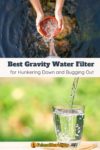
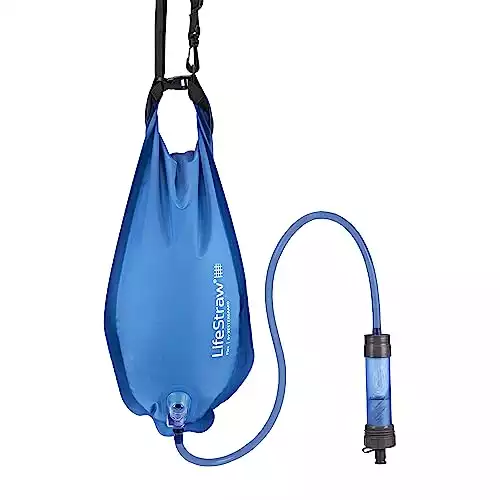
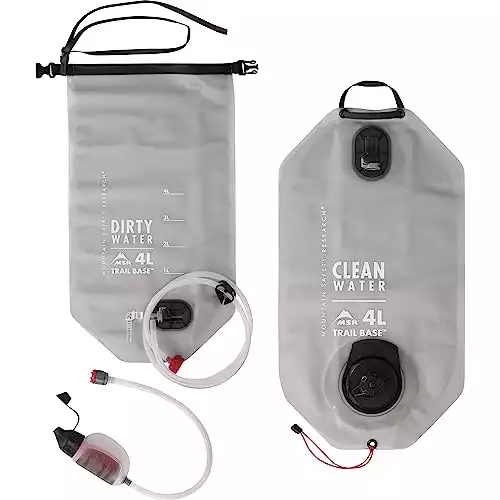
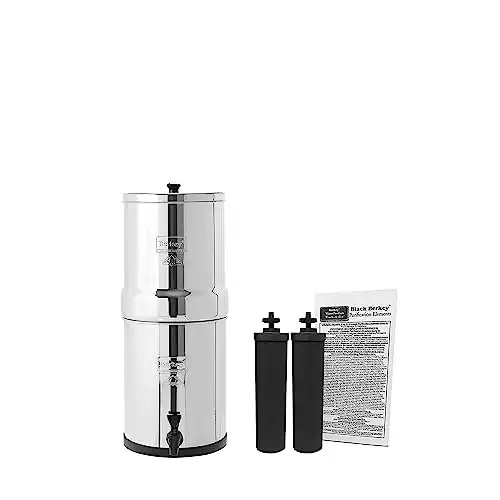
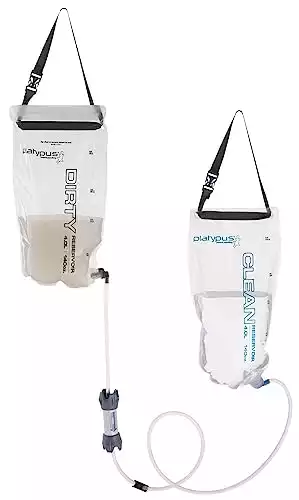
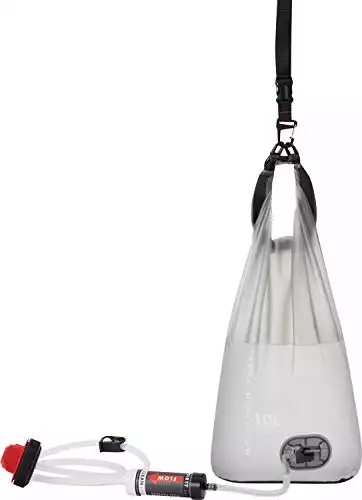


I like the price of the Travel Berkey. I also like that it can sit on my counter.. Would I be giving up to much if I bought this filter instead of one of the larger Berkey systems, such as the Royal? We have two adults and two small 20 lbs dogs in our house.